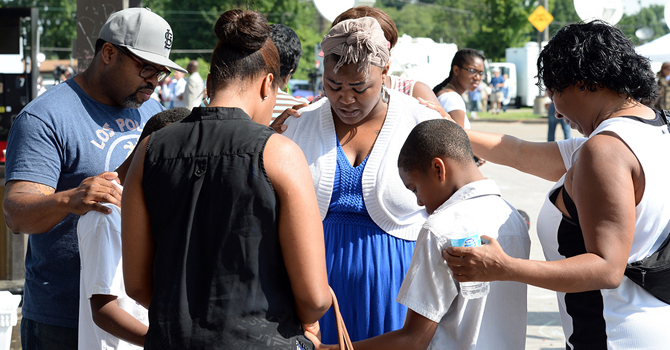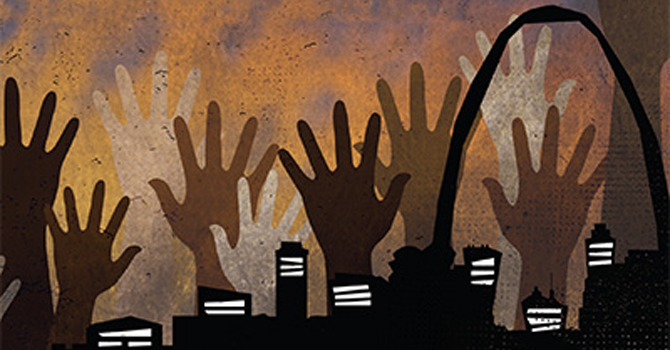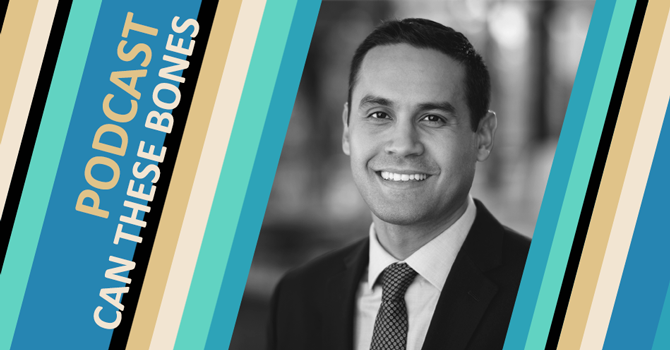Update: In September 2020, the Rev. Dr. Starsky Wilson was named president and CEO of the Children's Defense Fund.
Three months after the shooting of Michael Brown by police in Ferguson, Missouri, sparked widespread protests, the governor of Missouri created the Ferguson Commission.
The Rev. Starsky Wilson was chosen to be a co-chair of the group, which was charged with undertaking “a thorough, wide-ranging and unflinching study of the social and economic conditions that impede progress, equality and safety in the St. Louis region” and recommending steps to make the region a “stronger, fairer place to live.”

The process, which Wilson led with civic leader Rich McClure, resulted in a series of public hearings, a deep investigation into inequality and racial justice, and some 200 “calls to action” to address the issues that led to the events in Ferguson. After issuing its report, called “Forward Through Ferguson,” the commission completed its work at the end of 2015 and created a nonprofit to advocate for its recommendations.
Although the Ferguson Commission’s work was focused on the St. Louis region, faith leaders across the country can engage in justice and advocacy work, Wilson said.
“I encourage people in their respective communities to find their Ferguson,” he said.
Wilson, who is the pastor of Saint John’s Church (The Beloved Community) in St. Louis as well as the president and CEO of Deaconess Foundation, a faith-based grant-making organization, spoke recently with Faith & Leadership while at Duke working on his doctor of ministry degree. The following is an edited transcript.
Q: What can the wider Christian community do in response to Ferguson?
I encourage clergy, no matter where they are, to find ways to integrate themes of race into their local conversations and their contexts.
I also think that we would do well to mine the biblical text for resources that speak to cultural distinctions and how communities have connected with these issues in the past -- or how they’ve split communities in the past.
So I think those are basic tasks that are connected to our work.
For those who understand their vocation or their church’s vocation to be connected in a wider public space, they should be connected to some faith-based organizing network or advocacy network to inform their work.
The final thing I say -- and I say this everywhere I go -- is I encourage people in their respective communities to find their Ferguson. You can look at any metropolitan area and you’ll find all of the elements that become the powder keg, quite frankly, for the Ferguson uprising.
So the question is, how will you engage in those spaces and places in order to build up the community’s capacity to respond before you have these incidents?
Q: Do you think that white pastors have a particular role?
I think in many ways it depends on where someone chooses to play, right? There are so many roles within the wider movement.
Quite frankly, this is a youth-led movement. So if this is the space where we find ourselves, really getting into this youth-led uprising, clergy’s role is to follow. The church’s role is to create space and to legitimize some of the work.
I think there’s a responsibility of relationship across the lines that, if nowhere else, the church should be able to model.
We see it even in the street-organized activism, because these are very multicultural spaces. They just happen. This is unique in American life -- they’re multicultural, but they’re black-led.
And that’s the tough part, right? So how can we prepare our hearts and our minds to be in multicultural spaces that are black-led?
I live this. My church is a multicultural church; I’m an African-American pastor. These are some of the most difficult things to pull off.
It’s difficult for white people to recognize and honor black leadership. It illustrates the strength and the power of the idea -- what Bryan Stevenson calls the greatest legacy of trans-Atlantic slave trade, which is the pervasive persistence of the idea of white supremacy in America.
Not just white privilege, but literally the idea of white supremacy, in a racialized hierarchy. That’s the difficult residue that we continue to deal with. It also points us to the origins of the church in a unique way.
I’m really helped by the work of Allan Boesak and Curtiss DeYoung. They wrote the book “Radical Reconciliation.” They center the community of the first-century Jesus movement as a community where you saw people of privilege in Roman society renounce their privilege in order to take up leadership from marginalized Jewish apostles.
So if we consider that, then part of the difficult witness for those who have privilege within the life of the church is to actually renounce a bit of that privilege.
The place of the church is always on the side of people with the least power.
It’s to strategically deploy their privilege on behalf of marginalized communities, but also to systemically defer to those who have been marginalized by society. And that has the makings of an authentic church community.
And so that’s difficult work, quite frankly, and it requires us to be thoughtful about white privilege and white supremacy, and it requires us to be thoughtful about middle-class privilege as well. There are many middle-class black people that need to be thoughtful about this.
So, to your question about white Christian leadership, I think there’s a responsibility for relationship with African-American communities in particular, but always marginalized communities, and sometimes relationships of mentorship, whereby [white Christians] are in the second seat, not the first seat.
And there’s this obligation to follow into the work, to listen and to follow into the work, rather than attempt to lead out.
Q: Your leadership is on multiple levels. You were named by the governor to head this commission, and yet you’re out at night bailing people out of jail. Is there a tension there?
There’s definitely tension, and there’s unique responsibility for sustaining relationships, authentic relationships. But I’ve also got to be really clear about who I’m there for and who sent me there, right?
And I’m very clear that the place of the church is always on the side of people with the least power. And so my responsibility is always to the people who are deeply affected by policy, even if I’m in a policy conversation.
It’s quite frankly one of the reasons why, even before the commission work, I served at Saint John’s. My church is on the north side of St. Louis, an economically depressed, predominantly African-American area, and when I went to the Deaconess Foundation, I was concerned that I would lose credibility. So the church was a way of making sure that I was still connected to issues related to marginalized poor children.
But if we really want to impact policy for the sake of people and make structural change, we’ve also got to illustrate some efficacy in a wider “grass-tops” context, right? We’ve got to be able to navigate how these systems work.
I joke with people that one of the things I learned in church that is helpful to me in grass-tops mobilization is Robert’s Rules of Order. Yes, I’ve been trained in community organizing, but we’ve got to know how to run a meeting.
Take the example of the consent decree in Ferguson. The Ferguson City Council essentially gutted a consent decree with the Department of Justice with a parliamentary procedure. And then said, “We passed it.” Well, if you don’t understand Robert’s Rules of Order, you might actually fall for that argument, you know?
We need to know Tillich and we need to know Barth, but if we’re going to engage in a wider public space, we’ve got to know Robert.
Q: So what’s next for you as a leader, and how do you see the work of the commission going into the future?
I’m one of three incorporators for a nonprofit called Forward Through Ferguson. It is staffed by three members of the Ferguson Commission’s staff, and its organizing board includes former commissioners of the Ferguson Commission. And their charge is to sustain the evaluation, monitoring, measurement and communication around the report’s findings.
I’ve committed to community organizing, and keeping and sustaining an "organizing table” that has prioritized the commission’s findings for the sake of their own work.
So that’s our grass-roots work -- sustaining those things that are prioritized by this organizing collaborative. Our grass-tops work is to establish a 25-year managed fund for racial-equity infrastructure throughout the region.
And then, of course, working and responding to legislatures who are trying to move different pieces. We’re really glad that this last year in December there were 13 pieces of legislation filed that are aligned with the Ferguson Commission’s recommendations and calls to action. And so trying to keep pushing those through our state legislature is part of our work as well.
Q: This is a term I don't know: "organizing table."
It means a community of people who are coming together to work together and hold one another accountable and to network.
Q: Like a coalition?
Yes.
Q: So how are you feeling about everything now? Do you feel hopeful?
I do feel hopeful. I feel good about the movement that’s happening. I feel good about the increased capacity at the grass-roots level. I think that will help to sustain some of the activity and the work.
I feel like I’ve not been the best steward of this experience. My leadership mentors and others are telling me you’re not a good steward at this moment unless you’re reflecting and writing to leave a path for someone who comes after. So that’s my leadership responsibility now.
And that will allow me not just to feel hopeful about the work that’s happening now; it will make me feel like I’ve been faithful to the moment by sharing, documenting, reflecting on my own experience in a way that is helpful, supportive, fruitful for someone else.
The Robert Wood Johnson Foundation gave us a $100,000 grant to create a community “playbook” -- to say, “We know this is going to happen again, [and we] want to create a document that can be out there for the next community that deals with this.”
Because unfortunately, although we’ve seen this proliferation of violence in communities, in the last two years we’re the only community that’s established any kind of [community] commission to [address it].
We’ve been on phone calls with people from Chicago to Baltimore to North Charleston to Charlotte. But folks don’t do it, and I don’t know why, because the response [in Ferguson] has been so positive.
Q: It’s pretty amazing what you’ve been doing: four kids, pursuing a D.Min. degree, the Ferguson Commission, pastoring a church, working as a foundation CEO. And your wife also is a busy professional. In a profession where people talk about burnout and depletion, one might wonder how you manage so much. How do you do it all?
Burnout is real, absolutely. And the great grace that I have is, the work that I’ve done with the commission is really an outgrowth of the work that we’ve been doing at the foundation, and the work that we’ve been doing around community organization and advocacy is really an outgrowth of our ministry at the church.
In so many ways, the church and the foundation have sent me forth into this work, and there’s a remarkable alignment there.
The greatest sacrifice, quite frankly, has always been with the family. I found myself at 3, 4 in the morning out on the streets, on police lines and the like.
And so that was the more difficult piece. Now it’s the increased travel that comes from trying to leverage philanthropic engagement in this kind of work across the country, which is where I find to be my primary work at this point.
And all of that can only be explained by a super wife who is totally committed to the work as well, and supporting me in it, and quite frankly my kids, who I think I’m doing the work for. I mean, when all of this began, I had three sons, so there are ways in which I understood their lives to be caught up in this work, so that’s part of the sacrifice.
Q: And now you have three sons and a daughter?
She’s officially our movement baby. And lighting up the whole house and the world, and giving us all joy.
Q: Well, and another difficult thing to manage -- a new baby.
The great gift of this process is that God saw fit that about a year and a half ago, my mother-in-law moved to St. Louis from Louisiana. She doesn’t live with us, but she’s with us daily, supporting and helping with the kids, and so that’s a great gift to us.
Q: Still, you say burnout is real. How have you managed that over this very intense time?
I’ve been able to take advantage of extending travel by a half a day. I mean, literally, one of my basic tactics is I like to go a half a day early to go in, to settle, using flights to read. I never, ever, ever get the Wi-Fi on the plane; it’s actual quiet time.
And I’ve done a little better with self-care as I’ve seen some strains show up. So those kinds of things have been helpful to me along the way.
I’ve also cut out any local social activity that’s not required and not connected to my family.
Q: Does that mean you don’t have friends?
My friends tend not to be local. So I have these boundaries that I set. When I’m in St. Louis, I’m working, I’m doing community work, I’m a pastor, or I’m home.
And when I’m with my friends, who are largely in other places, I’m just with them. So I’m really present in the spaces that I’m in, and I make clear decisions about what spaces are valuable for my soul and for my vocation.
The other thing is that worship has to be worship. Worship can’t be work for me. I’ve got to be focused and present in that responsibility and in that celebration of God’s presence when I’m there, to fully experience it.
Last thing, my most basic boundary is I don’t talk on the phone in my house. No matter the case. If I’ve got a business call I’ve got to finish, or whatever -- I’m giving counseling over the phone -- I will stand on my porch and finish a phone call. But I will not take a phone call in the door, over the threshold of my house. When I’m in the house, I belong to my family.
Questions to consider
Resources for social justice work
recommended by Starsky Wilson
Reading:
“America's Original Sin: Racism, White Privilege, and the Bridge to a New America,” by Jim Wallis
“Democracy in Black: How Race Still Enslaves the American Soul,” by Eddie Glaude
"Flak-Catchers: One Hundred Years of Riot Commission Politics in America," by Lindsey Lupo
“Ferguson, Mo. Emblematic of Growing Suburban Poverty,” by Elizabeth Kneebone of The Brookings Institution
“Forward Through Ferguson,” by the Ferguson Commission
“Radical Reconciliation: Beyond Political Pietism and Christian Quietism” by Allan Boesak and Curtiss Paul DeYoung
Organizations:
Gamaliel Network
Industrial Areas Foundation
Live Free Campaign
PICO Network
Samuel Dewitt Proctor Conference
Other resources:
















